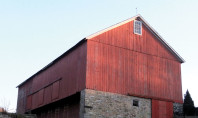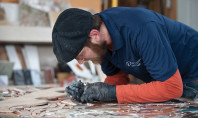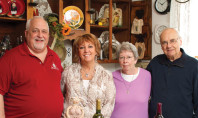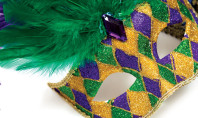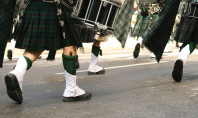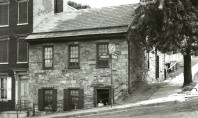Accessible Arts

University theatre programs cater to vision and hearing impaired guests
Watching a movie or seeing a play can be great fun for the whole family, but imagine if you were unable to actually see or hear what’s happening? The entire experience changes, although reactions from others who are watching may give away some clues, or simply raise further mystery. For many years, this is just the way it’s been for many guests with vision or hearing loss who chose to visit theatres,
until recently.
A collaborative movement in the Lehigh Valley is gaining ground in an effort to bring the full theatre experience to guests who have visual or hearing impairments. Over the past few years, Muhlenberg College and DeSales University have shown great success in adding accessibility services to their theatre programs. In fact, the very first audio-described and open-captioned performances in the Lehigh Valley took place at Muhlenberg College for the Muhlenberg Summer Theatre’s production of “Godspell” and at DeSales University’s production of “The Miracle Worker”, which featured American Sign Language interpreters as well as audio description for blind patrons.
“During Open Captioned performances, all dialogue and sound effects are presented in real-time on an LED screen that is adjacent to the stage,” said Roseann Damico-Schatkowski, Director of Marketing & PR for the Division of Performing Arts at DeSales University. “During Audio Described performances, all action and physical appearances are described live through a headset.”
In addition to her position, Damico-Schatkowski assists in the coordination of the accessible performances. She explained that guests wishing to hear the audio description services use a receiver and earphone to listen to a live transcriber describing from the control booth. The open caption screen is mounted on the stage to the left side of the house, with seating in front of the screen for patrons requesting this service.
“Many of our older patrons find it useful when they have trouble hearing the dialogue,” Damico-Schatkowski said.
Muhlenberg College played a major role in bringing accessible theatre options to the Lehigh Valley, partnering with DeSales University and numerous other organizations in the area and neighboring counties.
“Everyone, regardless of physical limitations, should be able to enjoy the experience of live theatre.”
“Several years ago, a woman that used to work at the Center for Vision Loss reached out to form a group with the intention of bringing accessible arts programming to the Lehigh and Montgomery Counties,” said Jessica Bien, General Manager of the Department of Theatre and Dance at Muhlenberg College. “I was thrilled that the Lehigh Valley was finally embracing [this]. Through that initial request, the Tri-County Accessible Arts Coalition was formed. Through assistance from Mimi Smith of VSA Pennsylvania, based in Philadelphia, (and director of the Amaryllis Theatre Company in Philadelphia) we were able to start to offer services here, borrowing equipment from Philadelphia and Lancaster organizations.”
Prior to working at Muhlenberg, Bien served as the Access Coordinator at The Wang Center for the Performing Arts in Boston, MA, where she coordinated many audio-described, open-captioned, and ASL-interpreted performances (including many firsts for the Boston area). Once at Muhlenberg, she put her experience to work for the college and also happily assisted Act 1, DeSales University Performing Arts with their performances, giving guidance and assistance in areas ranging from marketing the performance to running the equipment, and helping with staffing and seating, in an effort to make the initial process a little less daunting in the beginning.
The entire initiative to bring accessible programming has been a tremendous group effort. It would be difficult to name everyone who’s pitched in to make things happen. “It has been a collaborative effort of the arts community as well as the visual and hearing impaired community and disability friendly community as well,” Forte said. “We are working together to try to foster more cultural events for people with disabilities, and to that end, we raise money to purchase open captioning and audio description equipment [which uses natural pauses to insert narrative, and while playing, a transcriber translates the visual image into audio form] to be available and shared.”
The Lehigh Valley Arts Council offers the accessibility equipment for a small rental fee for any organization interested in using it, and also offers periodic training sessions on how to put on a successful production using the equipment as well as detailed instruction on serving as audio describers.
“Even with the equipment, it takes time to get an organization to commit volunteers or staff to use it,” Forte said. “It becomes less expensive to offer these opportunities if you have someone in house to do it. When you hire, it becomes more costly, and we are trying to make it affordable and available as often as possible so people have considerable access and so they have choices just like anyone else. We are hoping to train a community of volunteers interested in how the equipment works. This program helps a lot more people than those who are technically deaf and blind, especially those who are aging.”
Muhlenberg’s recent performances using the specialized services include “Hairspray,” “Merrily We Roll Along,” and “Crazy for You.” The college reaches out to its patrons to determine which performances the community using the accessibility services would be most interested in seeing. Some factors that come into play when deciding if a particular show can support the accessibility equipment come down to the theatre itself, whether the production is a musical or a play, the length of the run, and the complexity of the script, among other considerations.
At DeSales, last year’s open captioned and audio described performances were “A Christmas Story” and “A Tale of Two Cities”, with previous past performances of “Lost in Yonkers”, “Rodgers & Hart: A Celebration” (audio description only), and “The Trial of Ebenezer Scrooge”. This season, the university plans to offer one accessible performance date for each of their theatre shows.
Muhlenberg and DeSales both block off a number of seats for patrons who will use the services when an upcoming performance plans to use the accessibility equipment. Muhlenberg currently has 20 headsets and DeSales tends to hold around 50 seats for patrons who will make use of the accessibility offerings. Additionally, both colleges offer sensory tours prior to these performances, where visually impaired guests are invited to come an hour and a half or hour and fifteen minutes early to receive a tour of the stage, to talk about or meet the characters, and to become enmeshed in the play prior to its beginning, which enhances the experience for these guests.
“Everyone, regardless of physical limitations, should be able to enjoy the experience of live theatre,” said DeSales’ Roseann Damico-Schatkowski.
Those interested in accessible performances at DeSales should contact box office manager Dael Jackson at 610.282.3654, ext. 1 to make a reservation. Tickets are half price for patrons using the special services during these performances. Those interested in visiting Muhlenberg’s accessible productions should contact Jessica Bien directly at 484.664.3087 or bien@muhlenberg.edu.

